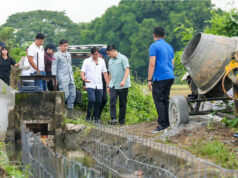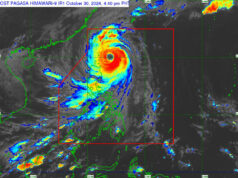The Philippines human development index score placed it tied at 107th, up four places from a year earlier but still in the bottom half of the 189 countries studied, according to a report by the United Nations Development Program (UN) issued Friday.
The Philippines had a Human Development Index (HDI) score of 0.718, the UNDP said in its Human Development Report 2020, which carries the title “The Next Frontier: Human Development and the Anthropocene.” The rating scale used in the study has 1 as the top score.
Also tied for 107th place were Indonesia and Bolivia.
A year earlier, the Philippine score was 0.711, good for 111th place.
The HDI measures three key dimensions of human development: life expectancy, expected years of schooling, mean years of schooling, and standard of living, as quantified via per capita gross national income. The estimates for the Philippines were 71.2 years life expectancy, 13.1 years of expected schooling, 9.4 mean years of schooling, and per capita GNI of $9,778.
The UNDP classifies countries with scores of 0.800 as “very high” in terms of human development, those in the 0.700-0.799 range are deemed “high” and those between 0.550-0.699, “medium.” Countries scoring less than 0.550 are classified as having a low level of human development.
The Southeast Asian leader was Singapore, tied for 11th at 0.938. Brunei was 47th at 0.838, followed by Malaysia, tied for 62nd at 0.810, and Thailand, tied for 79th at 0.777. Vietnam was tied for 117th at 0.704.
Norway topped the rankings with a score of 0.957, with Ireland tied for second place at 0.955 with Switzerland. — Beatrice M. Laforga
Unless humanity ‘relaxes its grip on nature,’ COVID-19 will not be the last crisis it faces — UNDP report
The pandemic has exposed the deep flaws in the world’s societies, exacerbating inequalities. The United Nations Development Program (UNDP)’s Human Development Report 2020, titled The next frontier: human development and the Anthropocene, stated that human progress is interconnected with nature and unless humanity relaxes its grip on nature, the coronavirus disease 2019 (COVID-19) pandemic will not be the last crisis it faces.
Anthropocene is an unofficial unit of geologic time used to describe the most recent period in Earth’s history when human activity began to make a significant impact on the planet’s climate and ecosystems.
According to the United Nations Office for Disaster Risk Reduction, the number of disasters linked to natural hazards has increased 75% over the last 20 years; these disasters have affected more than 4 billion people, claiming 1.23 million lives and causing close to $3 trillion in economic losses.
INEQUALITY AND PLANETARY PRESSURE
“No country has yet achieved a high HDI (human development index) with low planetary pressure,” said Yemesrach A. Workie, senior policy advisor of UNDP Philippines. “This is the new frontier for human development in the age of the Anthropocene.”
Inequalities between countries and within countries are at an all-time high, she said in a presentation. This results in a decline in social mobility, rising social instability, and democratic backsliding.
The Philippines, said Ms. Workie, could gain much from addressing inequality. It continues to make progress in human development, but is slightly lower than the East Asia and Pacific average, ranking 107 out of 189 in 2019. All three components of human development—life expectancy, education, and gross national income (GNI) per capita—in the country showed sustained progress, but there is room for improvement.
A NEED FOR A COLLECTIVE VISION
People have a difficult time grasping slow-onset phenomena like climate change, said Emmanuel S. de Dios, professor of law and economics at the University of the Philippines School of Economics. The Anthropocene is an era, he noted in a panel discussion, and not a six-year plan. “What’s the future economy supposed to look like that’s consistent with mitigating the challenge of the Anthropocene? There’s no clear picture of that yet.”
He added that there is a need for a collective vision so people are motivated to act on an individual basis. “The report alluded to the problem where people realized the importance of the issue but were less willing to take action. It’s because they don’t know what to do,” said Mr. de Dios. “If you don’t think your action makes a difference, you won’t act.”
George T. Barcelon, chairman of Philippine Chamber of Commerce and Industry, suggested incentivizing consumers to help reduce overall carbon footprint. “We need to ask ourselves: what would we bequeath future generations if the way we run things is always based on consumption? We have cryptocurrency now. Maybe we could also have carbon footprint currency down the line, and people with reduced carbon footprint could use such currency to get other things.”
ADDRESSING VULNERABLE SECTORS
Poverty and inequality, two perennial issues in development, were raised in the discussion. Progress had been made in poverty alleviation pre-pandemic, with nearly six million people lifted out of poverty in 2018, according to the Philippine Statistics Authority. The vulnerable lower middle class, however, still find themselves in a precarious situation because of their differential access to mechanisms like healthcare and security of employment.
“There is that part of the population that is not poor and so isn’t part of the government’s attention. They’re not rich either so they’re also not benefiting from economic growth,” said Mr. de Dios. “There needs to be an in-between. Social mechanisms are needed in order to address inequality.”
Addressing this point, Rosemarie G. Edillon, undersecretary of the National Economic and Development Authority (NEDA), shared that the agency has already finalized a social protection floor, which it hopes will be approved this year.
“We recognize that it’s not just the poor that’s affected by this but also those who are beyond poor but not really rich,” she added. “Of course it’s still a matter of resources. That’s a problem with us.” — Patricia B. Mirasol



